|
The Hellenic Genocide
Quotes from historical documents and related Photos. |
|||
CHAPTER IX: "Enough has been said, however, to convince the reader that the extermination of the Christians of Turkey was an organized butchery, carried out on a great scale, and well under way before the Greeks were sent to Smyrna. We have seen it in operation in the days of Abdul Hamid, "the butcher," we have seen it more fully developed and better organized under Talaat and Enver, those statesmen of the "Constitution." We shall behold it carried out to its dire finish by Mustapha Khemal, the "George Washington" of Turkey." CHAPTER IX: "This part of the story would not be complete if I passed over in silence the systematic extermination, and the satiating of all the lowest passions of man or beast which characterize Turkish massacres of the Greeks and Armenians of the Pontus. There have been, from time to time, descriptions of the massing of bands of these wretched people at different points on the shores of the Black Sea where they had arrived after long journeys on foot and indescribable hardships, and of the relief given them by American organizations. Often officers of these organizations, or American missionaries, have uttered cries of protest, which have caused a momentary feeling of wonder in the minds of the American people, or have passed unheeded. Yet the systematic massacre, deportation, plundering and violation that went on among the Christians of once prosperous region of the Black Sea is one darkest and foulest pages even in Turkish history." CHAPTER IX: "The flourishing communities of Amasia, Caesaria, Trebizonde, Chaldes, Rhodopolis, Colonia, centers of Greek civilization for many hundreds of years have been practically annihilated in a persistent campaign of massacre, hanging, deportation, fire and rape. The victims amount to hundreds of thousands, bringing the sum total of exterminated Armenians and Greeks in the whole of the old Roman province of Asia up to the grand total of one million, five hundred thousand. Thus has been created that "regenerated" Turkey, which has been compared in some quarters to Switzerland and the United States." CHAPTER X: "I RETURNED to Smyrna in 1919, shortly after the Greek army had landed in the city. As the Turkish plan of extermination was well under way before the arrival of the Greek troops, the Christian peasants had been driven out of the entire region with the exception of the city itself, and many had perished, their farms and villages being destroyed." CHAPTER XI: "DESPITE many difficulties, the Greek civil authorities, as far as their influence extended, succeeded in giving Smyrna and a large portion of the occupied territory, the most orderly, civilized and progressive administration that it has had in historic times. Mr. Sterghiadis, who continued to the last his policy of punishing severely all offenders of Greek origin against the public order, lost, for that reason, popularity in Asia Minor." CHAPTER XI: "During the Greek administration, I traveled frequently over a large part of the occupied territory and visited many of the interior villages. I found perfect security everywhere, native Greeks and Turks living together on friendly terms. In general there would be in each village a small administrative office in charge of a petty officer and two or three aides. I noticed the persistent effort, which these people made to fraternize with the Turks and to placate them." CHAPTER XI: "There were also sporadic acts of great ferocity committed against the peaceful Christian inhabitants of the country, which were always attributed by the Turks to roving bands of Chetas. Who these Chetas were, I do not know, but it is my opinion that they did not come from far. I remember one particularly atrocious case-the massacre and disemboweling of a Greek miller and his wife and their two children." CHAPTER XII: "Whatever nuclei of civilization existed in the Ottoman Empire outside of Constantinople were Greek, Armenian or something besides Turkish. The non-Mussulmans built the good houses and the better parts of the towns. Many of the Christian houses and towns had already been destroyed by the followers of Talaat and Enver, leaving little of any permanent value in the path of the Greek army." CHAPTER XII: "He went to the station himself and saw a long train of cars on to which a small detachment of Greek soldiers was attempting to embark the frightened people. While this operation was being conducted the Mussulman villagers came out from their houses, all armed, and began to fire upon the soldiers and the train. A battle ensued in which the officer commanding the detachment and several of his soldiers were killed. But the soldiers stood their ground well and succeeded finally in getting away with the larger part of the Christians. This specific incident throws light upon the Greek retreat as it shows that the Moslems were, in general, in possession of concealed weapons and that they did not hesitate to use them." The Hellenic Genocide Quotes from historical documents and related Photos. Previous page | Initial page | Site Map | Next page (19th of 29) |
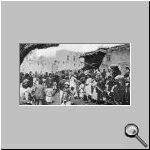
Refugees at Van crowding around a public oven.
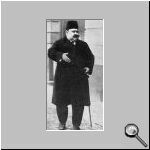
Halil Bey in Berlin. President of the Turkish Parliament.
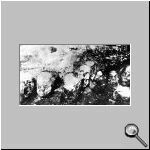
Skulls and heads of massacred Christians.
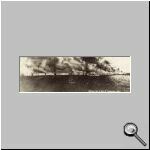
A wide view of Smyrna on fire.
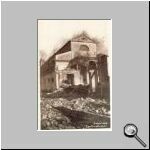
The Cathedral of Smyrna. Burnt.
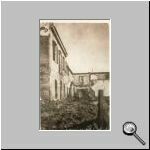
The Saint Antonios Hospital in Smyrna. Burnt.
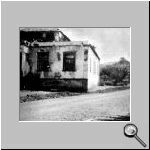
A school in Imvros, ruined by the Turks.
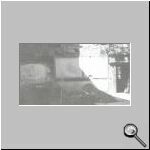
Destruction of the access to the holy water.
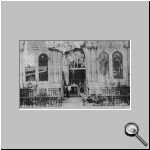
Church of Saints Constantine and Helene.
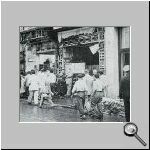
People looking at destroyed Hellenic property.